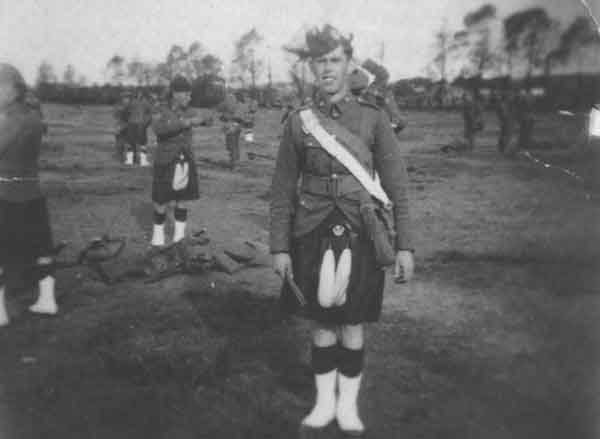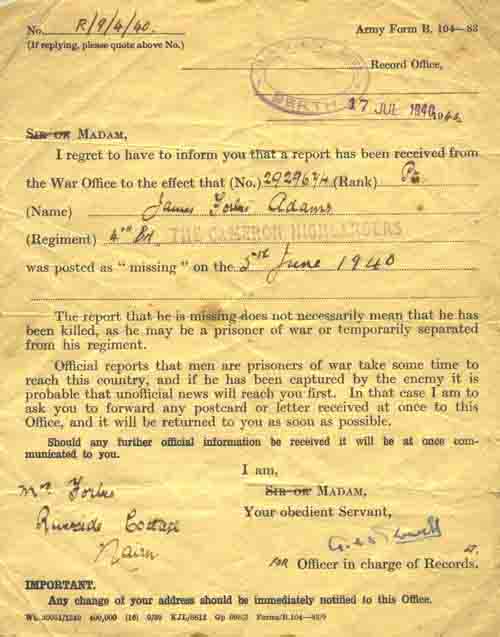|
|
|
Those known to have fought in St Valery during the Second World War 1939-1945. The names on this list have been submitted by relatives, friends, neighbours and others who wish to remember them, if you have any names to add or any recollections or photos of those listed,
please
Add a Name to this List
Records of St Valery from other sources.
|
|
|
The Wartime Memories Project is the original WW1 and WW2 commemoration website.
Announcements

- 1st of September 2024 marks 25 years since the launch of the Wartime Memories Project. Thanks to everyone who has supported us over this time.
- The Wartime Memories Project has been running for 25 years. If you would like to support us, a donation, no matter how small, would be much appreciated, annually we need to raise enough funds to pay for our web hosting and admin or this site will vanish from the web.
- 26th Mar 2025 - Please note we currently have a huge backlog of submitted material, our volunteers are working through this as quickly as possible and all names, stories and photos will be added to the site. If you have already submitted a story to the site and your UID reference number is higher than
265607 your information is still in the queue, please do not resubmit, we are working through them as quickly as possible.
- Looking for help with Family History Research?
Please read our Family History FAQs
- The free to access section of The Wartime Memories Project website is run by volunteers and funded by donations from our visitors. If the information here has been helpful or you have enjoyed reaching the stories please conside making a donation, no matter how small, would be much appreciated, annually we need to raise enough funds to pay for our web hosting or this site will vanish from the web.
If you enjoy this site
please consider making a donation.
Want to find out more about your relative's service? Want to know what life was like during the War? Our
Library contains an ever growing number diary entries, personal letters and other documents, most transcribed into plain text. |
|
Wanted: Digital copies of Group photographs, Scrapbooks, Autograph books, photo albums, newspaper clippings, letters, postcards and ephemera relating to WW2. We would like to obtain digital copies of any documents or photographs relating to WW2 you may have at home. If you have any unwanted
photographs, documents or items from the First or Second World War, please do not destroy them.
The Wartime Memories Project will give them a good home and ensure that they are used for educational purposes. Please get in touch for the postal address, do not sent them to our PO Box as packages are not accepted.
World War 1 One ww1 wwII second 1939 1945 battalion
Did you know? We also have a section on The Great War. and a
Timecapsule to preserve stories from other conflicts for future generations.
|
|
Want to know more about St Valery? There are:25 items tagged St Valery available in our Library There are:25 items tagged St Valery available in our Library 
These include information on officers, regimental histories, letters, diary entries, personal accounts and information about actions during the Second World War. |
|
R J Hastings 5th Btn. Gordon Highlanders My father, R J Hastings was in the Gordon Highlanders 5th Btn. He was captured at St.Valery and held in StalagXX1D.
|
James Gordon I am searching for anyone who was at the same camp as my uncle during WW2. He was captured in 1940 at St. Valery. His name is James Gordon from Dundee. The information I have is E793 BAB21, Stalag 344, Blechhammer. I have many photographs taken at the camp and would be willing to share them with anyone, or the families of anyone who was there.
|
Harry Dalby 1st Battalion The Black Watch, 51st Highland Division My late grandfather Harry Dalby was a POW in Stalag XXA. I have had his prisoner of war records translated and they give 2.K Batlingen, Batlingen 20 and Reigersfeld as work camps.
My grandfather, while in one of the camps, had what can only be described as a large hankie or part of a sheet with his Battalion's badge and two soldiers in highland dress on either side of it. This was drawn in ink we were told. It also has HE YDEBRECK written on the top of it which I believe is Batlingen. We have no idea who made this for him so if anyone has any idea or info I would be very greatful.
He was in the 1st Battalion The Black Watch, 51st Highland Division captured St.Valery 16/6/40.
|
James Forbes "Pongo" Adams The Queen's Own Cameron Highlanders The name James Stobie is so familiar!! My late father was James Forbes Adams of Nairn, was in the Cameron Highlanders (51st Highland Division). He was a drummer with Cameron Highlanders (Territorials) Pipe Band, and as he was 18, he got called up to take place of the 17 year old tip drummer.  James Forbes Adams at breakup of a Territorial camp near Fort George, just prior to hostilities.
 The dreaded telegram his aunty received when he was posted missing.
Dad did attempt escape twice, once in Holland on the long march to Germany, and I believe the other time was when he was at Stalag XXA (Fort 13). He ended up at Stalag XXB. It was hard to get him to talk about his experiences. As a child, I can vividly remember him waking up screaming as a result of the nightmares (right up until the early 60's). He once let his guard down and told me how one night he awoke thinking he was dyingas he was completely soaked in blood. Sadly it was the chap in the bunk above him who had taken his own life.
|
L/Cpl. James Leech 1st Field Squadron Royal Engineers (d.25th Dec 1940)  James Leech was married and a father of 4 children. His wife was Mary Agnes Leech. Prior to the start of the war, the family lived in Army Quarters in Aldershot at 12 Cowie Square. Whilst he was away on active service his family and all the other residents of Cowie Square were given three hours notice to vacate the quarters as they were required by the military. Cowie Square subsequently remained empty for more than two and a half years.
Not much detail is known about James and the 1st Field Squadron except that it became part of the 51st Highland Division.
What did the Sappers do in that catastrophically badly managed campaign? Why have the non-Scottish members of the 51st Highland Division been given almost no mention in the history of that campaign?
He was taken as a prisoner of war upon the surrender of the Division at Saint Valery and marched with others to a prisoner of war camp in Poland.
The camp was Stalag XXIB (21B).
His wife, my mother, received some letters from him but he never received any from her and their children.
Representatives from the Red Cross visited her regularly assuring her that they were in touch with the prisoners and he was well. His letters to my mother painted a very different picture about the conduct of the Red Cross.
My father died on Christmas Day 1940 but my mother did not find out until June 1941 when she met the wife of another prisoner at Aldershot. She had to contact the authorities to confirm the truth.
Prior to the war, James was an ardent member of the Ancient Order of Buffaloes who he said would support his wife and family if anything ever went wrong. My Mother contacted them and was told that as his subscriptions were not up to date they were not interested in providing any help.
No reason has ever been provided about the cause of my father's death. His letters indicated that he was in good health.
|
Pte. William Crawford Mustarde 1st Battalion Gordon Highlanders William Mustarde was captured at St. Valery on 12th of June 1940 and spent the rest of the war as a POW in Stalag XX-B. He survived the war and passed away at the age of 92.
|
Cpl. Cyril Jones Royal Welch Fusiliers Cyril Jones was my Dad. He was captured in Saint Valery en Caux, France, on 12th of June 1940 as part of the BEF. Although he was part of the 51st Highland Division, he was actually a member of the Royal Welch Fusiliers.
He spent the remainder of the war at Stalag IX-C and other camps in the area of Bad Sulza.
A fluent speaker of German (learnt at school), Dad became a so-called Vertrauensmann (a Man of Confidence) which, as I understand it, meant that he represented the British and English speaking prisoners.
Dad rarely spoke about the war or his time as a POW but around 1999 he took part in a specially made programme for my son, who interviewed him about his life leading up to and during the war. We still have that recording, which has become a family treasure.
|
Pte. John "Jock" Murphy 1st Btn. Gordon Highlanders  Jock Murphy, my Grandfather was a military man. t aged 15 he tried to enlist in the Royal Scots but his mother put a swift end to that. She was anti military having lost her husband in 1920 to war related injuries.
Jock's father, John Murphy, was a KOSB and he served in the first and second Boer Wars and in France WW1. Jock was determined to be in the military and when his mother decided in 1928 to pack up and head for Australia Jock stayed behind and aged 17, he joined the Gordon Highlanders.
He served in India at the Khyber pass, Peshawar and Palestine and he participated in the Parade at Gibraltar when the 1st and 2nd Battalions met up in 1934.
In 1939 he headed off to France and was back in Edinburgh briefly in 1940 before returning back to France.
Jock had been injured in combat and was walking wounded when he was captured at St Valery-En-Caux on 12th of June 1940.
He was a PoW in Stalag XXA & XXB for 5 years and survived the Death March before liberation.
After returning home he was ready to head off to fight the Japanese but the war was over by then and his want to do this was driven by the knowledge that his best mate and brother in law Freddy Logan (Herbert) was in the second Battalion and was a PoW having been captured at the fall of Singapore.
After the war Jock was in the Military Police and he gathered his children from Inverness and they lived in the Tower of London.
Jock served in the Suez conflict and by 1955 he decided it was time to pack the family up and head for Adelaide where his mother, sisters and some cousins lived.
His eldest son, my Uncle Pat, at age 17 like his father, stayed behind and he served with the British Military as did my cousins and now their children serve.
5 generations.
I am Australian but my heart is British when it comes to the Military.
|
Pte. John "Jock" Forbes Royal Army Service Corps John Forbes served with the Royal Army Service Corps and was a Prisoner of War, captured at St Valery, France with 51st Highland Division.
|
2nd Lt. John Ibbotson 23rd Field Regiment Royal Artillery (d.12th Jun 1940) John Ibbotson is buried in St. Valery-en-Caux Franco-British Cemetery.
|
Recomended Reading.Available at discounted prices.
|
|
|









